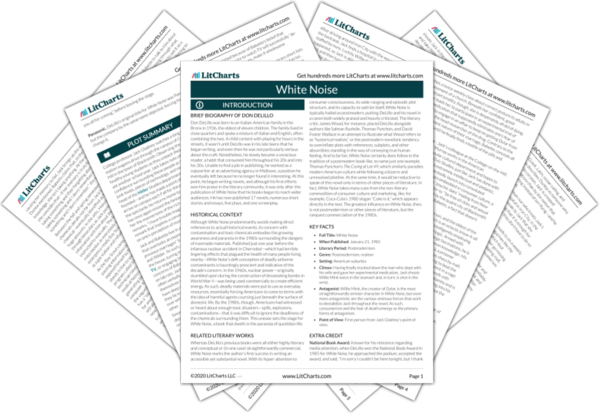In White Noise, the supermarket represents the myriad influences of consumerism on American culture. Portrayed by Murray as a “gateway or pathway” to spiritually charged levels of consciousness, the supermarket embodies the alluring quality of contemporary marketing and the power of the “psychic data” it projects onto the consumer. The shelves of products are full of this data, densely populated by branded labels, brightly colored packages, fine print, and loud product names. While Jack and his family visit this place to satisfy the simple necessity of buying groceries, their trips seem to also give them something more deeply existential, as if the supermarket has become a secular church, a place fraught with cultural significance. In one of his first monologues, Murray stands in the grocery store and delivers a monologue about the Tibetan notion of death as an art. “Here we don’t die, we shop,” he says, walking through the dairy aisle. In this way, the act of shopping becomes a life-affirming endeavor, something to stave off death. It’s no wonder, then, that Jack is drawn throughout the novel to the supermarket, which is the setting for many important conversations, including his first indication that Babette is taking Dylar. The supermarket is a place of conversation and revelation, a hub of interaction and connection to both people and the material world.
The Supermarket Quotes in White Noise
Everything is concealed in symbolism, hidden by veils of mystery and layers of cultural material. But it is psychic data, absolutely. The large doors slide open, they close unbidden. Energy waves, incident radiation. All the letters and numbers are here, all the colors of the spectrum, all the voices and sounds, all the code words and ceremonial phrases. It is just a question of deciphering, rearranging, peeling off the layers of unspeakability. Not that we would want to, not that any useful purpose would be served.










